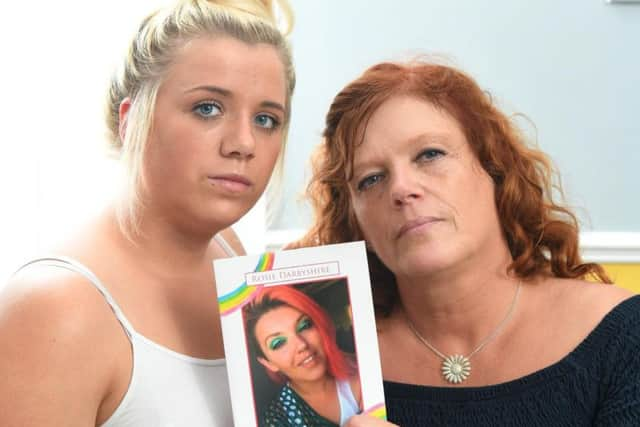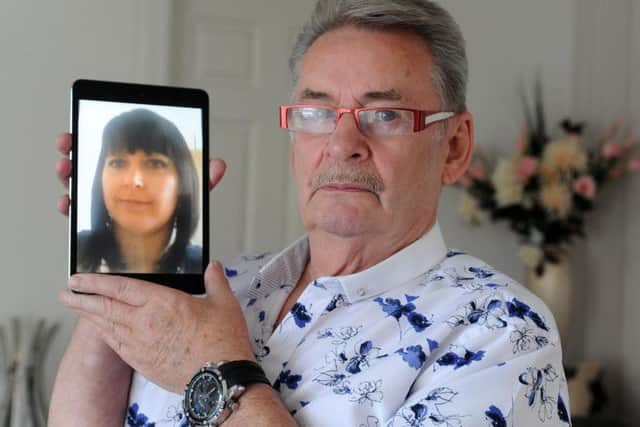‘If this helps just one family, then it will honour our Rosie’


Clare’s Law - officially known as the Domestic Violence Disclosure Scheme - allows people to ask police whether their partner has a violent past - but forces have up to 35 days to respond.
When Rosie Darbyshire was murdered by her boyfriend Ben Topping in Ribbleton in February, she was waiting for a reply to a Clare’s Law inquiry on Topping’s violent past.
Advertisement
Hide AdAdvertisement
Hide AdThe Post later teamed up with Rosie’s family to set up a petition, calling for Clare’s Law requests to be sped up, which was signed by more than 10,000 people in four months.


Now the Home Office has agreed to work with police on a review of the time-frames for disclosures under Clare’s Law - meaning at-risk people could be entitled to swifter responses from their local force.
Although Rosie’s family will never know if receiving the information more quickly would have made a difference to Rosie, they had been calling for disclosures to be sped up as to help protect others at risk from violent partners.
Rosie’s sister Alice Hodgson said today: “We as a family can not thank everyone enough for all the signatures and sharing. Without this, we wouldn’t have got this result.
Advertisement
Hide AdAdvertisement
Hide Ad“It has come from such heartbreaking circumstances but us as a family are amazed that we have made a difference. If this helps one family to not go through what we have then we can be happy knowing we have done this in honour of our Rosie.”


The call for a review had been supported by Michael Brown, the father of Clare Wood, who was killed by her ex-partner and who Clare’s Law is named after. Mr Brown fears the legislation is becoming “redundant” due to police forces taking too long to give out vital information.
Mr Brown, of West Yorkshire, said: “My daughter died because some ‘man’ couldn’t understand ‘no’ and the police are telling me it is going to take 35 days for a reply.
“Five weeks that some woman is going to be tortured, battered, killed? Five weeks, when all they have to do is press a button to find out a person’s history. With ANPR you can tell if a car is taxed, MOT, insured instantly. This is a car at the end of the day. Why not yes or no to Clare’s Law in 48 hours and then take their time to explain their reasons? It’s not good enough.
Advertisement
Hide AdAdvertisement
Hide Ad“This sent Clare’s Law back to the Stone Age and Clare’s Law was made redundant the day they told to come back in five weeks. They have killed Clare’s Law with five weeks and 10 years of my life just went by the board.
“I want to see a review of Clare’s Law and who has decided the five week period when these men and women are in clear danger. Rosie Darbyshire’s case has highlighted what can happen, but this must have happened more times than enough. If I had known the deadline was five weeks, I would have done something sooner.”
Hyndburn MP Graham Jones took issue to Parliament after being made aware of the Lancashire Post’s campaign by a constituent.
In late August, he raised a Parliamentary Question to the Home Secretary Priti Patel, asking her to review the scheme. Speaking to the Post in August, Mr Jones said: “I fully support the campaign and each of the changes that the Lancashire Post and Rosie’s family are calling for.
Advertisement
Hide AdAdvertisement
Hide Ad“Whilst Clare’s Law is vital, it needs updating to ensure it protects people at risk. Unfortunately, as Rosie’s case sadly shows, the current time-frame is far too long.”
The Home Office has now admitted “we need to improve the operation of the scheme”.
A Home Office spokesman said today: “Clare’s Law is an important tool designed to keep people safe.
“The 35 day limit refers to the timescale for the entire Domestic Violence Disclosure Scheme process, but initial checks must be carried out within 24 hours. If police identify an immediate risk at any point, officers must take immediate action to protect the applicant.
Advertisement
Hide AdAdvertisement
Hide Ad“We are currently working with the police to review the guidance used by forces, including the time frame for disclosure.”
The spokesman added that the Home Office was working with the police to enable online applications to the scheme, to improve accessibility. They also said that under the Domestic Abuse Bill, which was introduced into Parliament on July 16, the scheme would be put on a statutory footing, driving “greater use and consistent application of the scheme by placing an express duty on the police to have regard to the guidance”.
Speaking yesterday Mr Jones said: “The launch of a Home Office review in to Clare’s Law is an important step in protecting vulnerable men and women at risk.
“A review of the law was much needed, as the tragic death of Rosie Darbyshire showed that the current timeframe is far too long. I congratulate everyone who has supported the Lancashire Evening Post and Rosie’s family in their campaign for a review of Clare’s Law.”
What the police say
Advertisement
Hide AdAdvertisement
Hide AdNational Police Chiefs’ Council Lead for Domestic Abuse, Deputy Chief Constable Louisa Rolfe said: “The Domestic Violence Disclosure Scheme (Clare’s Law) is an essential tool to inform victims and potential victims at risk of domestic abuse.
The disclosure process must balance the risk posed with our obligations in handling personal data and ensuring that it is complete and accurate.
“We recognise that informing someone that their partner has a history of abuse can create greater risk and we must ensure that the right safeguards are in place through advice, support and protection where necessary.
“We know that serial perpetrators of domestic abuse may move across police force boundaries and we may need to seek background information from other law enforcement partners so that we have a full picture of their offending and have properly assessed the risk.
Advertisement
Hide AdAdvertisement
Hide Ad“While some complex enquiries can take some time to complete, we seek to disclose information at the earliest possible stage to protect a potential victim and many
will be completed far
sooner than the 35 day time limit.
“We are working with the College of Policing to ensure that information on serial perpetrators is more accessible to police systems and an online form is being rolled out to forces to speed up disclosure applications.”
The Post petition
The key points Rosie’s family and the Post called on the Home Office to look at in our petition were:
++A reduction in the 35-day timescale for applications to be resolved
Advertisement
Hide AdAdvertisement
Hide Ad++A 48-hour callback from the police to update the applicant on the process after first contact
++ A national database containing details of people charged with or convicted of violent offences
++A publicity campaign on what Clare’s Law is and how to apply
Facts and figures
There were were 6,313 ‘right to know’ requests to police forces across the country in the 12 months up to March 2018.
Advertisement
Hide AdAdvertisement
Hide AdAs part of the Freedom of Information requests, JPI Media asked to find out the average length it took forces across the country to respond to Claire’s Law requests.
None were able to provide the data.
Lancashire Police revealed that it had 833 Clare’s Law requests in 2017, 948 in 2018 and 627 up to the end of June 2019.
For the applications made in 2019, 12 of them were by men and 616 were made by women, and 50 disclosures were made
The disclosure percentage for 2017 was 55 per cent and 59 per cent in 2018.
Advertisement
Hide AdAdvertisement
Hide AdIf checks made by the police do not show that there is a pressing need to make a disclosure to prevent further crime, the applicant will be told of that. This may happen if the person enquired about does not hold a record of abusive offences or there is no information available that indicates that they pose a risk to the potential victim.